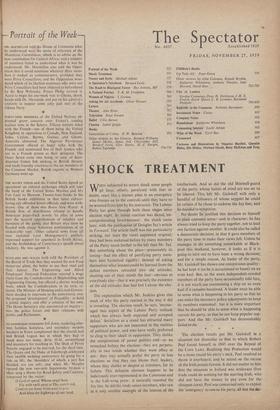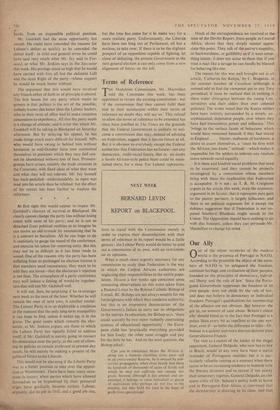SHOCK TREATMENT
WHEN subjected 4o severe shock some people gb limp; others, paralysed with fear or doubt, react like a trainee pilot in an emergency who freezes on to the controls until they have to be wrested from him by his instructor. The Labour Party has gone through both these stages since election night. Its initial reaction was dazed, un- comprehending bewilderment : the shock came later, with.the publication of Douglas Jay's article in Forward. The article itself was not particularly striking, nor were the views expressed original; they had been endorsed before by many members of the Party much farther to the left than Mr. Jay. But something about the piece—presumably its timing—had the effect of petrifying party mem- bers into hysterical rigidity: instead of asking themselves what lessons could be learned from the defeat members retreated into old attitudes, shutting out of their minds the fact—obvious to everybody else—that it was precisely the existence of the old attitudes that had lost Labour the elec- tion.
The explanation which Mr. Jenkins gives this week of why the party reacted in the way it did is revealing. The election result, he says, 'encour- aged that aspect of the Labour Party outlook which has always both expected and accepted defeat.' Socialism as a creed has attracted many supporters who are not interested in the realities of political power, and who have really preferred to cling to their ideals in opposition. They dislike the compromises of power polities and—as we remarked before the election—they are perpetu- ally in two minds whether they want office or not : they may actually prefer the party to lose elections so that they can blame their leaders, whom they dislike or despise as trimmers, for its failure. This defeatist element happens to be ludicrously over-represented in the Commons and in the Left-wing press : it naturally resented the Jay line. So did the trade union members, who saw in it only another example of the treason of the intellectuals. And so did the old Shinwell-guard of the party, whose habits of mind are too set to be altered. This left Mr. Gaitskell with only a handful of followers of whose support he could be certain if he chose to endorse the Jay line; and he decided to temporise.
No doubt be justified this decision to himself as plain common senseand in character; he has always tried to keep the party together, not to lead one faction against another. It could also be called a democratic•decision, in that it gave members of the party time to make their views felt. Unless he manages to do something remarkable at Black- pool this weekend, however, it looks as if it is going to turn out to have been a wrong decision; and for a simple reason. As leader of the party, Mr. Gaitskell has shown one conspicuous quality : he has kept it (as he is accustomed to boast) on an even keel. But, as the more independent-minded members of the party have occasionally told him, it is not much use maintaining a ship on an even keel if it remains becalmed. A leader must be able to sense what is happening in his party so that he can make the necessary policy adjustments to keep its members contented : but it is more important that he should be able to sense what is happening outside his party, so that he can keep popular sup- port: And this Mr. Gaitskell has demonstrably failed to do.
* *, The election results put Mr. Gaitskell in a situation not dissimilar to that in which Robert Peel found himself in 1845 over the Repeal of the Corn Laws. Realising that Protection would be a stone round his party's neck, Peel resolved to throw it overboard; and, he seized on the excuse of the Irish potato famine. It did not matter to him that the situation in Ireland was irrelevant (free trade could do nothing for the starving Irish, who did not have the money to pay even for the cheapest corn); Peel was concerned only to exploit the 'emergency' to rescue his party, all but the die-
hards.. from an impossible political position.
Mr. Gaitskell had the same opportunity last month. He could have conceded the reasons for Labour's defeat as quickly as he conceded the defeat itself : in mild and general terms he could have said very much what Mr. Jay said in For- ward, or what Mr. Jenkins says in the Spectator this week. His prestige stood so high that he would have carried with him all but the defeatist Left and the dead Right of the party—whose support he would be much better without.
The argument that this would have involved any breach either of faith or of principle is absurd. The first lesson for any party which wants to govern is that politics is the art of the possible; nobody knows this better than the Labour leaders, who in their term of office had to make countless concessions to expediency. All that the party needs is a change of attitude; and it is for this which Mr. Gaitskell will be asking in Blackpool on Saturday afternoon. But by delaying his appeal, he has made things much more difficult for himself. MPs who would have swung in behind him without hesitation in mid-October have now committed themselves to positions which they may feel can- not be abandoned without loss of face. Pressure- groups have arisen, notably the trade unionists in the Commons, with fixed ideas of what they want and what they will not tolerate. Mr. Jay himself has back-pedalled—understandably, as more was read into his article than he relished; but the effect of his retreat has been further to weaken the reformers.
At first sight this would appear to impair Mr. Gaitskell's chances of. survival at Blackpool. He clearly cannot change the party line without losing touch with most of his party; and he is not so detached from political realities as to imagine he can revive an old crusade by announcing that he is a convert to Socialism. All he can hope to do is cautiously to gauge the mood of the conference, and exercise his talent for restoring unity. But this may not be as difficult as it has been made to sound. One of the reasons why the party has been suffering from so prolonged an election trauma is that members need reassurance; they want to be told they are loved—that the electorate's rejection is not final. The atmosphere of a party•conference may well induce a feeling of would-be together- ness that will suit Mr. Gaitskell well.
It will not, then, be surprising if he re-emerges next week as the man of the hour. Whether he will remain the man of next year, is another matter. The Labour Party is in so deplorable a condition at the moment that the only long-term tranquillity it can hope to find, unless it wakes up, is in the grave. The great issues which concern the elec- torate, as Mr. Jenkins argues, are those to which the Labour Party has signally failed to address itself; if Mr. Gaitskell is merely going to reassert his dominance over the party, at the cost of allow- ing its policies to remain irrelevant to present-day needs, he will merely be making a present of the political future to the Liberals.
This would not be alarming if the Liberal Party was in a better position to take over the opposi- tion at Westminster. There have been many occa- sions in history when parties which have allowed themselves to be hypnotised by their primaeval urges have gradually become extinct. Labour, arguably, did its job in 1945, and a good job too; but the time has come for it to make way for a more realistic party. Unfortunately, the Liberals have been too long out of Parliament, all but a nucleus, to take over. if there is to be the slightest prospect of an opposition capable of fighting. let alone of defeating, the present Government at the next general election it can only come from a new alignment of forces on the left.



























































 Previous page
Previous page